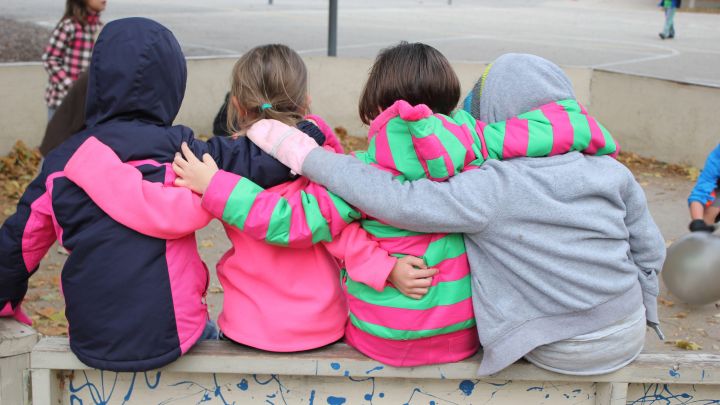Empathy in the Classroom
When my kids were young, they listened to Adventures in Odyssey so much that they would often quote this line from a favorite episode, “Empathy is the power to understand the mind and emotions of another person, i.e., I know how you felt when a hammer hit your thumb because I once had a hammer hit my thumb. I have empathy for you.” Empathy, this ability to understand another, is particularly powerful when building belonging in a school. As empathetic people, we don’t have to experience the exact same painful “hammer experience.” Instead, we can understand our students and our colleagues from a broader perspective, recognizing what it feels like to struggle, grieve, get angry, lose control, and be lonely—to be, well, human.
Empathy as Educators
As educators, we are learning from recent research that there is educational benefit to using empathy in the classroom. Google “empathy in the classroom” and you will find lots of articles about the benefits of empathetic students – they are more cooperative, more engaged in learning, have higher GPAs, and greater long-term success as leaders in their communities. Michele Borba, Ed.D., in her book, Unselfie: Why Empathetic Kids Succeed in an All About Me World, outlines nine habits for building empathy in students and says that a lack of empathy hurts students’ academic performance, leads to bullying behaviors, correlates with more cheating, and less resilience. Additionally, a lack of empathy hampers their ability to collaborate, innovate, and problem-solve in their adult vocations. With the data mounting about the importance of empathy, educators are being called to model and teach empathy.
Empathy as Inclusive Educators
As inclusive educators, we add another dimension to empathy in the classroom. All Belong’s Puzzle Piece Perspective (see the video on the right) reminds us that each of us has strengths and weaknesses; no one is only “green” (has only strengths). All of us know what it means to struggle with a task, understand a concept, or perform in an area of weakness at some point in our lives, and, therefore, we can show empathy to each other when we see a member of our learning community struggling. Inclusive educators can build this understanding with their students and model empathy for them.
Empathy as Inclusive Christian Educators
As inclusive Christian educators, we add yet another dimension to the concept of empathy in the classroom. In an inclusive Christian classroom, empathy is not just a teaching strategy—it is a reflection of the love and compassion that Christ shows to each of us.
My daughter’s favorite Bible story when she was young was the “hurt man.” I am not sure why the Parable of the Good Samaritan (Luke 10: 25-37 NIV) resonated with her so strongly, but maybe it was because, at an intuitive level, she could relate to each of the characters in the story. Some years ago, I heard a sermon on this passage that has stuck with me. The preacher urged us to recognize and remember that we all have times throughout our lives when we are the one who passes by on the other side, when we are the one who stops and helps, and when we are the one who needs help. Remembering this opens us up as Christians to show genuine empathy as Jesus did with the widows, the sick, the children, and all who He encountered on earth.
As you intentionally mold and shape the culture of your classroom, incorporate the following practices to encourage the use of empathy in your classroom.
- Active Listening: The first step towards empathy is listening—really listening. Teachers should create an atmosphere where students feel comfortable sharing their thoughts and feelings. This means being patient, asking open-ended questions, and giving students the time they need to express themselves.
- Modeling Empathy: Students learn more from what we do than what we say. Teachers can model empathy through their interactions with students and colleagues. When a teacher shows understanding and kindness in their daily actions, students are more likely to follow suit.
- Integrating Empathy in Curriculum: Empathy can be woven into the curriculum in various ways. Literature, for instance, offers countless opportunities to explore different perspectives and understand the emotions of characters from diverse backgrounds. Discussions around these stories can help students develop a deeper understanding of others’ experiences. The Bible is full of examples of Jesus showing empathy to those around him; sharing these stories and what we learn about Jesus's character through these stories is a natural way to talk about empathy.
- Encouraging Collaboration: Group work and collaborative projects are excellent ways to foster empathy. When students work together, they must listen to each other, appreciate different viewpoints, and support one another. Teachers can facilitate this by assigning roles that require students to empathize with the needs and abilities of their peers.
- Creating a Safe Space: An empathetic classroom is also a safe space where students feel secure enough to take risks, make mistakes, and express their true selves. This safety comes from knowing their teacher and classmates will respond with understanding and support rather than judgment. The All Belong Puzzle Piece Perspective teaches students that we all have strengths and weaknesses and, therefore, we do not need to hide from each other but can celebrate the unique way God made each of us.
Empathy in the classroom is a powerful tool to build belonging in an inclusive, Christ-centered school, but it is also the way of Christ. It is a way for each of us—teacher, administrator, and student alike—to show and be shown Christ’s unconditional love. By cultivating empathy, we not only create a more inclusive and supportive learning environment but also help students grow in their faith and understanding of what it means to love one another as Christ loves us.
Just as I desire my kids to not only be able to rattle off the definition of empathy but to truly "Rejoice with those who rejoice; mourn with those who mourn" (Romans 12:15 NIV), so too should our schools and classrooms be spaces that mirror Christ’s empathy for us.

Marji Voetberg
Teacher Consultant and Educational Resources Manager
Marji Voetberg, a Teacher Consultant and Educational Resources Manager at All Belong, has spent over 25 years working in Christian inclusive education environments. Marji's passion for the beauty and benefits of an inclusive environment for all God's children has only increased throughout these years. When not at work, Marji can be found hiking, biking, walking, or cheering her kids on at their events.
